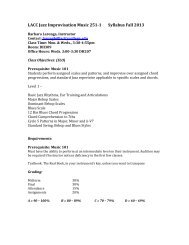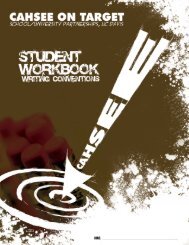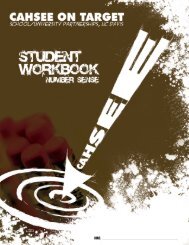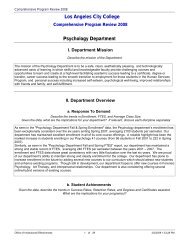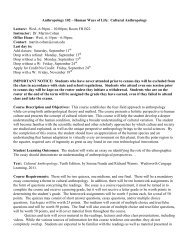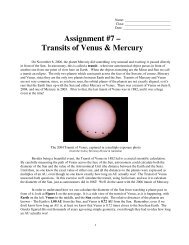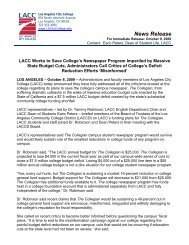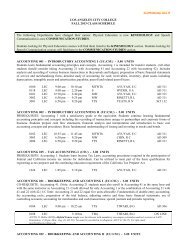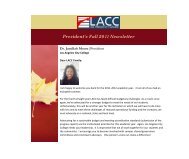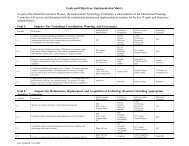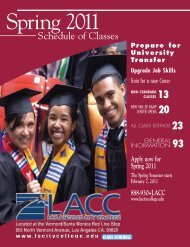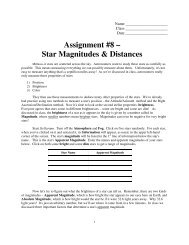2012 Fall Semester (PDF) - Los Angeles City College
2012 Fall Semester (PDF) - Los Angeles City College
2012 Fall Semester (PDF) - Los Angeles City College
You also want an ePaper? Increase the reach of your titles
YUMPU automatically turns print PDFs into web optimized ePapers that Google loves.
STUDENT RESpONSIBILITIES<br />
TO BE INFORMED<br />
It is the student’s responsibility to be familiar with the<br />
information presented in this catalog and to know and<br />
observe all policies and procedures related to the<br />
program he or she is pursuing. Regulations will not be<br />
waived and exceptions will not be granted if a student<br />
pleads ignorance of policies or procedures.<br />
While LACC academic counselors are available<br />
to assist you in planning your schedule, and other<br />
instructors are available to assist you, it remains the<br />
responsibility of the student to follow all polices and to<br />
meet all requirements and deadlines. Students need<br />
to satisfy the requirements of the catalog in effect at<br />
the time he or she is admitted to, and begins course<br />
work in, a degree or certificate program. If a student<br />
is not in attendance for more than one consecutive<br />
semester, he or she must follow the catalog in effect<br />
when they return. New catalogs take effect in the <strong>Fall</strong><br />
semester of the year published.<br />
CATALOG RIGHTS<br />
The college catalog is the document of record. A<br />
student will maintain “catalog rights” by continuous*<br />
attendance in the <strong>Los</strong> <strong>Angeles</strong> Community <strong>College</strong><br />
District to satisfy the degree, certificate or graduation<br />
requirements in effect at the college from which the<br />
student will earn the degree, certificate or graduate if:<br />
1. At the time the student began such attendance at<br />
the college, or<br />
2. At the time of graduation.<br />
* Continuous attendance means no more than a one<br />
semester absence within a school year, excluding<br />
summer sessions and winter inter sessions. Absence<br />
due to an approved educational leave shall<br />
not be considered an interruption in attendance, if<br />
the absence does not exceed two years.<br />
For purposes of implementing this policy, the<br />
college may:<br />
1. Authorize or require substitutions for discontinued<br />
courses; or<br />
2. Require a student changing his/her<br />
major to complete the major requirements in effect<br />
at the time of the change.<br />
DIRECTED STUDY COURSES<br />
Directed Study courses are offered by several<br />
academic and vocational departments. They are<br />
designed for students who are capable of independent<br />
work and who demonstrate the need or desire for<br />
additional study beyond the regular curriculum.<br />
Enrollment allows students to pursue activities<br />
such as directed field experience, research, or the<br />
development of skills and competencies under<br />
faculty advisement and supervision. Directed Study<br />
courses are available in a wide variety of disciplines.<br />
Students wishing to enroll in a Directed Study course<br />
should contact the appropriate department chair.<br />
Units are awarded depending upon satisfactory<br />
POLICIES: STUDENT<br />
performance and the amount of time committed<br />
by the student to the course. Allowable units vary<br />
according to discipline and are based on the following<br />
formula: Directed Study 185 (1-unit) = 48 hours per<br />
semester Directed Study 285 (2-unit) = 96 hours per<br />
semester Directed Study 385 (3-unit) = 144 hours<br />
per semester Students should note that there are<br />
limitations as to the allowable maximum number of<br />
Directed Study units. For all Directed Study Courses<br />
transferring to the University of California, the<br />
maximum credit allowed is 3 semester units per term<br />
or six units total in any and all appropriate subject<br />
areas combined. The granting of transfer credit for<br />
Directed Study courses is contingent upon review of<br />
the course outline by the appropriate UC campus. It<br />
is recommended that students consult with a <strong>College</strong><br />
Counselor and with the appropriate instructor and/or<br />
department chairperson before enrolling in Directed<br />
Study courses. Please refer to the current Schedule<br />
of Classes for information regarding specific Directed<br />
Study classes being offered.<br />
GRADE REpORTS<br />
The <strong>Los</strong> <strong>Angeles</strong> Community <strong>College</strong> District does<br />
not mail grades to students. Students may receive<br />
information on their grades through the Student<br />
Information on the web.<br />
You may obtain a printed copy of your grades from<br />
the LACC Admissions Office. This printed copy is not<br />
a transcript or a Verification of Enrollment. If you need<br />
a transcript or a Verification of Enrollment, you may<br />
order it from the Admissions Office.<br />
ADDING/DROppING CLASSES AND<br />
COLLEGE WITHDRAWAL<br />
LACC policies regarding adding and dropping classes<br />
are listed below.These policies are subject to change.<br />
Adding Classes:<br />
Only students who have been admitted to the <strong>College</strong><br />
and are in approved active status may add or attend<br />
classes. Registered students who are on a waiting or<br />
standby list must obtain permission from the instructor<br />
to add the class.<br />
During the first two weeks of the term, available<br />
classes are posted by section number in an area near<br />
the Office of Admissions in the Administration building.<br />
Dropping Classes:<br />
Students wishing to drop one or more classes must<br />
do so through the Office of Admissions by filing a drop<br />
card or web site. It is the student’s responsibility to<br />
drop from class if he or she decides not to attend or<br />
stops attending. Students might not be automatically<br />
dropped and/or excluded and will be accountable<br />
for any fees due. The following schedule applies to<br />
dropping classes. Any drops or exclusions that occur<br />
before the end of the 4th week of the semester (or<br />
30% of the time the class is scheduled to meet) will<br />
not be noted on the student records.<br />
Any drops or exclusions that occur between the 5th<br />
and the 12th week of the semester (or 75% of the time<br />
the class is scheduled, whichever is less)<br />
will result in a “W” (“Withdrawal”) on the student’s<br />
record, which will be included in the determination of<br />
progress probation. Drops are not permitted beyond<br />
the end of the 12th week. A grade (A, B, C, D, F, P, I,<br />
or NP) will be assigned to students who are enrolled<br />
past the end of the 12th week even if they stop attending<br />
class, except in cases of extenuating circumstances.<br />
After the last day to drop students may withdraw<br />
from class upon petition demonstrating extenuating<br />
circumstances. Petitions may be obtained from the<br />
Office of Admissions.<br />
Withdrawal from the <strong>College</strong>:<br />
It is recommended that students consult with a<br />
<strong>College</strong> Counselor when withdrawing (dropping all<br />
classes). Clearance of the record in courses where<br />
equipment has been issued is required when students<br />
separate from such classes.<br />
pROBATION & DISMISSAL<br />
Standards for Probation The following standards for<br />
academic and progress probation shall be applied<br />
as required by regulations adopted by the Board of<br />
Governors of the California Community <strong>College</strong>s.<br />
probation: A student shall be placed on probation if<br />
any one of the following conditions prevail:<br />
Academic Probation: The student has attempted<br />
a minimum of 12 semester units of work and has a<br />
grade-point-average less than a “C” (2.0).<br />
Progress probation: The student has enrolled in a<br />
total of at least 12 semester units and the percentage<br />
of all units in which a student has enrolled and for<br />
which entries of W (Withdrawal), I (Incomplete), and<br />
NP (No Pass) are recorded reaches or exceeds fifty<br />
percent (50%).<br />
Transfer student: The student has met the conditions<br />
of “Academic Probation” or “Progress Probation,”<br />
above, at another college within the <strong>Los</strong> <strong>Angeles</strong><br />
Community <strong>College</strong> District. Units Attempted: “Units<br />
Attempted,” for purposes of determining probation<br />
status only, means all units of credit in the current<br />
community college of attendance in which the student<br />
is enrolled.<br />
Standards For Dismissal:<br />
Students shall be subject to dismissal and<br />
subsequently be dismissed under the conditions set<br />
forth within this section. Dismissal from <strong>Los</strong> <strong>Angeles</strong><br />
<strong>City</strong> <strong>College</strong> shall disqualify students from admission<br />
to any college in the <strong>Los</strong> <strong>Angeles</strong> Community <strong>College</strong><br />
District (LACCD).<br />
Academic Dismissal: Students who are on academic<br />
probation shall be subject to dismissal if they have<br />
earned a cumulative grade-point-average of less than<br />
2.0 in all units attempted in each of three consecutive<br />
semesters. Students who are on academic probation<br />
and who earn a semester grade-point-average of 2.0<br />
or better shall not be dismissed as long as this minimum<br />
semester grade-point-average is maintained.<br />
178 <strong>Los</strong> <strong>Angeles</strong> <strong>City</strong> <strong>College</strong> <strong>2012</strong> FALL Class Schedule — Monday, August 27, <strong>2012</strong> – Sunday, December 16, <strong>2012</strong>



